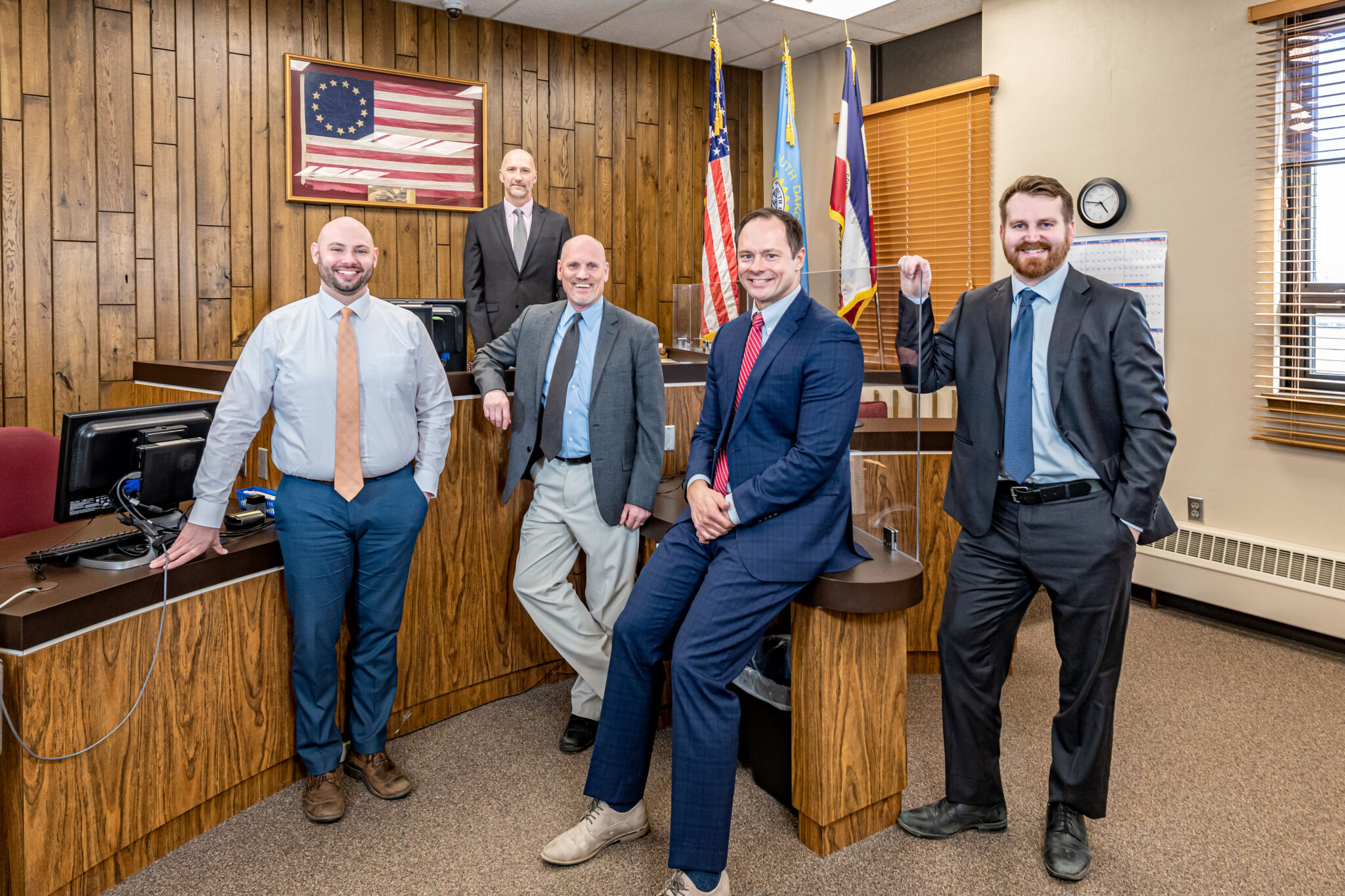

You know the clichés: the young, crusading attorney with a heart of gold believing the accused is both innocent and getting railroaded by the prosecution, or the incompetent ding-dong, distracted, in a hurry, unsure who the client is. Public defenders on TV are rarely three dimensional or realistic. The attorneys who have that job in the Aberdeen area would say it’s more complicated. These are their stories.
It may surprise some that we have public defenders or need them. In fact, the majority of criminal, misdemeanor, juvenile, and abuse and neglect cases in Brown County involve attorneys appointed in a public defender role. Despite frequently disappointing results, these attorneys see the humanity of their clients and provide the best defense they can.
Six Aberdeen attorneys contract with the county to receive appointments: Tom Cogley, Chris Dohrer, Scott Kuck, Jerry McNeary, Cristy Serr, and Brandon Taliaferro. The contract pays each attorney a fixed rate each month regardless of the level of work.
Court-appointed doesn’t mean free, however, as Scott Kuck explains. “The attorney gets paid by the county,” he said, “but they have to keep track of their time and turn a voucher in to the county. Then the client has to repay the county at the state’s court-appointed attorney rate of $101 per hour”—a rate lower than a standard private attorney’s fee.
Cullen McNeece, appointed in 2021 as Magistrate Judge in the Fifth Circuit (which covers 10 counties in northeastern South Dakota from the Missouri River to the Minnesota border), says he’s the “meet and greet judge.” Almost all defendants appear before him for misdemeanors, petty crimes, or felonies, and he makes most attorney appointments in Brown County. He hears all misdemeanor and petty crime trials, and felonies go to circuit court.
Jerry McNeary explained that defendants apply for an appointed attorney, and the magistrate determines if they qualify. Magistrate McNeece said “Most people meet the indigency requirements.” It’s expensive to retain an attorney, he added. The qualification is based not only on income, but the ability to hire a lawyer based on one’s other expenses as well. “In my time as magistrate,” he said, “I’ve only had to reject five or so applicants.”
When he makes appointments, he tries to make the workload among the attorneys fair, but there are some other factors to consider. For example, McNeary said “The magistrate will ask if a defendant has had an appointed attorney before and will appoint that attorney. This echoes Scott Kuck’s comment: “We get a lot of repeat customers.”
While the magistrate appoints in most cases, Tony Portra, a Fifth Circuit Judge, appoints for juvenile and abuse and neglect (A&N) cases. The latter require many appointments. In fact, in most A&N cases, he appoints an attorney for the children, one for the mother, and one for the father. He added that when he makes appointments, he makes some qualitative assessments.
“Attorneys and defendants appear before judges many times,” he said, “so we get to know if an appointment might work or might create a personality conflict. We’re looking for the best match for client and attorney.”
McNeary says all the contract attorneys are extremely busy with court appointed work, and it typically accounts for most of their workload. It’s not surprising. Magistrate McNeece says Brown County has about 2,000 cases a year, most of which get appointed to the six attorneys. In addition, some Aberdeen attorneys take appointments in other counties in the Fifth Circuit.
The most common cases they get tend to be drug and alcohol-related offenses, driving under the influence, and simple assault. McNeary adds that probably two-thirds of his appointed cases are tied to meth—possession, assaults, or other meth-connected felonies.
RITE OF PASSAGE?
These depressing cases make it sound like public defender work must be a rite of passage for new attorneys. Not so, says McNeary , who notes some of the contract attorneys are very experienced.
Kuck has been doing public defender work for 28 years, starting a year after law school. “I wasn’t planning on criminal law,” he said and joked “Public defender work isn’t going to let me retire soon.”
Tom Cogley, who has been practicing 11 years, says at first, he wanted to be a trust officer, but he liked the trial work he did during law school. “If you want courtroom and trial experience,” he said, “there are way more criminal trials than others.”
The work is challenging. Kuck said “I don’t want to say they’re all guilty, but the facts are against you. You’re always doing what’s in your client’s interest because you have a legal and ethical obligation to do that.” In addition, he added “I don’t treat privately retained clients differently than court appointed.”
In a similar ethical vein, Judge Portra noted “I don’t necessarily know if an attorney is appointed or retained when a case comes. I don’t want to know. I want to treat all defendants the same.” He added “We see the contract attorneys frequently, and they are sometimes retained, sometimes appointed, but I don’t need to know until sentencing.” Sentencing for clients with appointed attorneys includes repaying the county.
McNeary said matter-of-factly, including all criminal cases, whether the attorney is appointed or retained, “The vast majority of cases end in a plea agreement.” Most do not go to trial, “like on TV,” Kuck said.
Pithily, Judge Portra noted “Most of the time in criminal law, it’s not a whodunit but a how bad-is-it. You often prepare a case hoping to improve the plea agreement rather than hoping for an acquittal.” This is true whether the attorney is appointed or retained, he said, adding “A plea agreement doesn’t mean your attorney sold you out. They got the best deal for the client. The issue is the terms of the agreement, not the fact of having one.”
THEIR STORIES
The attorneys don’t tell many stories, but they shared some. Kuck remembers serving as a public defender in federal court for a client charged with aggravated assault for beating up someone who had harassed him in a bar. The victim had been warned to stop but ended up with a fractured skull. Kuck’s client was a former marine.
“So I asked him if he could wear his dress uniform. It was a jury trial, and I put him on the stand. I believe the jury wants to hear from the defendant. If you’re not guilty, why not? I wanted to present him as a good guy, who warned the guy to leave him alone.” Kuck concluded, “After the not guilty verdict, my client was in tears.”
In Cogley’s favorite story his client, a “very rough kid from Minneapolis,” was convicted of first-degree robbery, but had become a model prisoner.
“When he got to prison, he realized he never gave God a try,” Cogley said. “He started praying and felt God was changing him. I prayed for him too.”
The defendant had never admitted to the robbery, which he needed to do to get a reduced sentence. During a hearing in the appeal process, after the judge cautioned him against self-incrimination, he finally admitted to the crime and received the sentence reduction. Cogley concluded, “The guy went to prison expecting to be there the rest of his life but let God change him and he got some of his life back.”
WHY THEY DO IT
With depressing cases they mostly lose and that don’t make them much money, why do these attorneys do it?
“I enjoy the work,” McNeary said. “It’s not the most glorious work. It can wear you down, but occasionally a fun one that you look forward to will crop up.” The fun ones have an actual legal challenge, he notes, such as a constitutional issue in which evidence can’t be presented and the State must throw out the case. “It can be really hard dealing with tough clients, often losing cases and carrying large caseloads,” he said, “but occasionally you get the win, which is satisfying.”
Sometimes, it can be transformational. Kuck says he was a kind of “throw away the key” guy in law school. “But when you’re on the other side, you see that they’re just people who often haven’t had the greatest hand dealt in life—a lot of addiction that leads to bad things. People get in bad situations and need help.” He added “I love it, but it’s frustrating. You’re helping people when they’re in a really bad state in their life. At same time, there’s people you represent multiple times, and you’ve had conversations with, and they came back.” The “bottom line,” he said, is “you’re like a lifeline for somebody when they’re at the worst time in their life and might be going to prison, and you’re there to help them through this horrible time of their life.”
Sometimes it can be very personal. Cogley said “When I was younger, I was not a stranger to the courtroom as a defendant. At 21, a lot of poor decision making put me in the same position many of my clients find themselves in today.” That experience in the criminal justice system “leads me to provide respect and empathy to defendants now.” He added “I like the people and like to be next to them supporting them and treating them with respect through a dark time in their lives.” Several of his clients are now living exemplary lives. “When I get down, I think of them,” he said. “They’ve gone through a lot and gotten themselves out and should be applauded.”
As happens in the courtroom, the guys on the other side of the bench get the last word. “The court-appointed attorneys have a difficult job of managing client expectations, delivering bad news and still adequately representing them,” Judge Portra explained. “Think of the attorney advocating for a client and hearing a judge sentence the client to the pen or tell the client she’ll never see her child again.” It’s a very difficult thing to do, he said, because they align and identify with the client. Worse, the attorneys may “have to represent someone who is accused of doing something reprehensible, but they’re human. Everyone is human.” He concluded “One can empathize with the attorney who has to advocate for the client everyone hates. It’s tough work.”
Magistrate McNeece boils it down: “They get involved because everyone is a human being, everyone makes mistakes, and you help people get back on track.” A couple thousand people a year must appreciate it. //
What are Public Defenders and Why Do They Exist?
Cornell Law School’s Legal Information Institute defines the job simply, “A public defender is a lawyer who represents indigent criminal defendants.” Most of us can recite the standard TV Miranda warning: “You have the right to remain silent. Anything you say can and will be used against you in a court of law. You have a right to an attorney. If you cannot afford an attorney, one will be appointed for you.” The last sentence is about public defenders, and it derives from the U.S. Constitution. In the 1963 case of Gideon v. Wainwright, the Supreme Court ruled unanimously that the Constitution requires states to supply attorneys for defendants who can’t afford one.
The Court left the method of providing for public defenders up to each state, and South Dakota leaves it to each county. There are essentially three ways to provide public defenders. In South Dakota, the least common is the best-known type, the Public Defender Office, where the work is the full-time job of attorneys who are employed by the local government. Only Minnehaha, Pennington, and Lawrence counties use this approach. All other counties use a method of appointing attorneys for indigent defendants. Counties will either assemble a list of attorneys who are willing to be appointed for the role or establish a contract with certain attorneys. Brown County uses the contract method.















